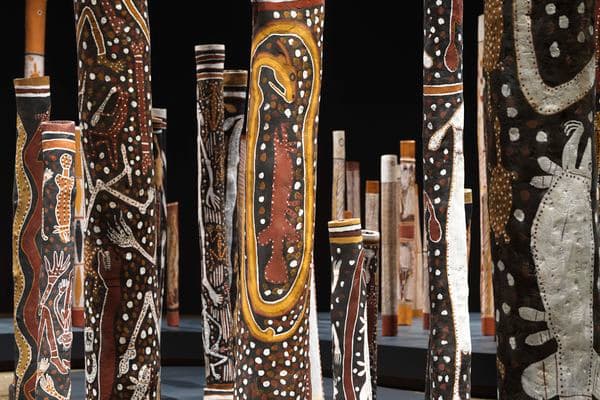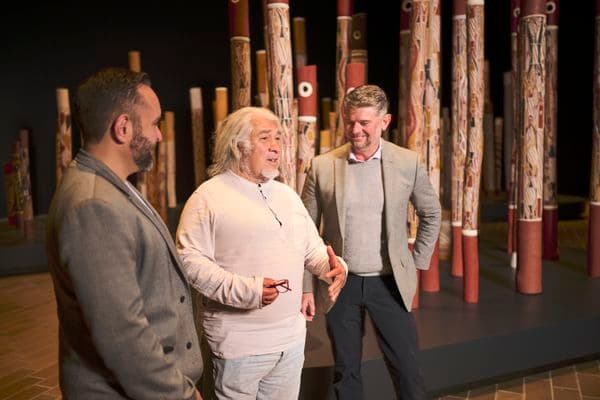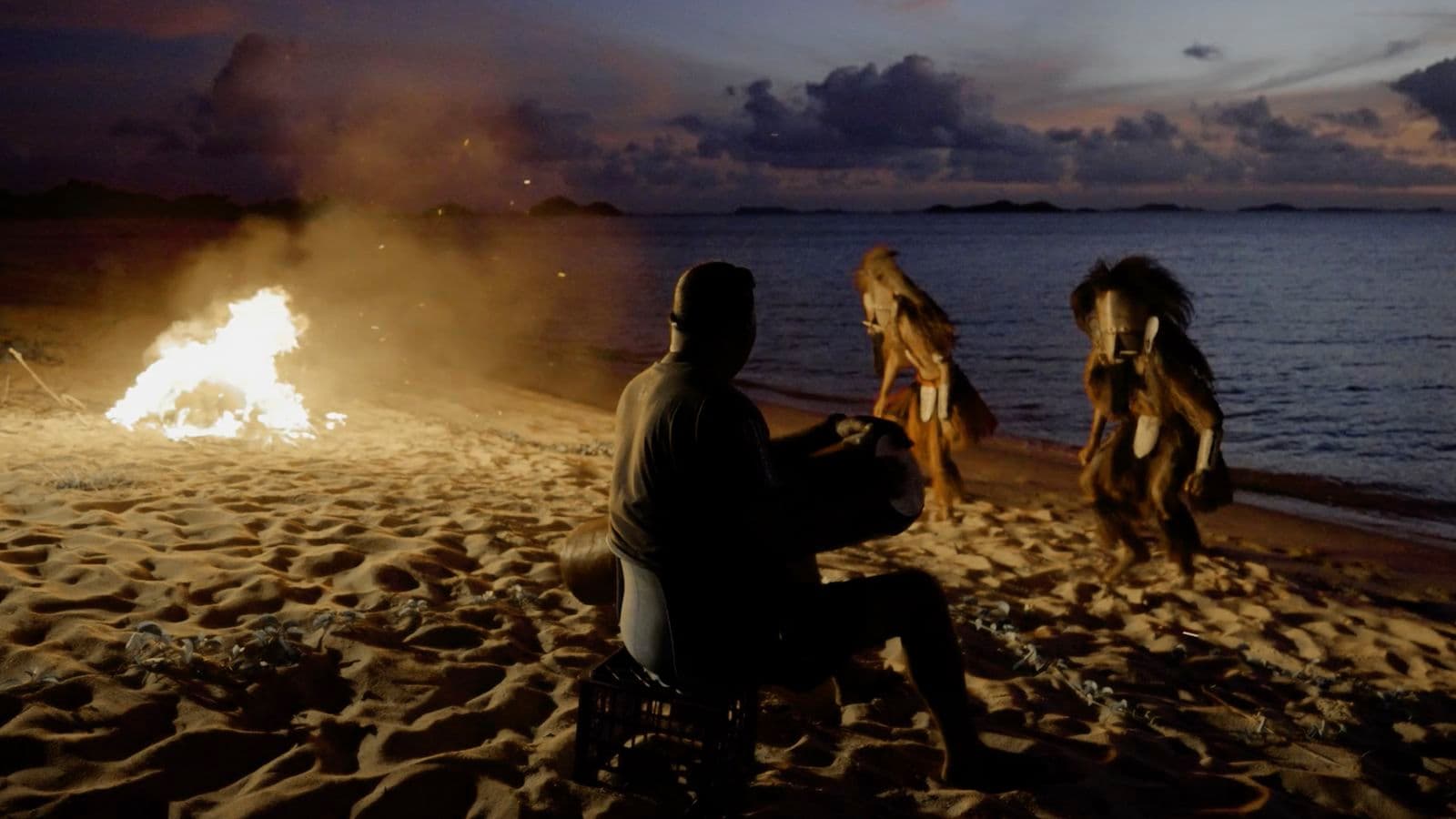Galpu, Liyagalawumirr, Wagilag and Wudumin people

Yambal Durrurrnga, Liyagalawumirr people, Pythons, leaves, tortoise, 1987-88, purchased with the assistance of funds from National Gallery admission charges and commissioned in 1987.
Key information
The Galpu, Liyagalawumirr, Wagilag and Wudumin people are linked by the major Dhuwa moiety theme of Wititj the Olive Python.
Liyagalawumirr literally means people with bark over their heads (as a shelter). Neville of the Liyagalawumirr people and Philip Gudthaykudthay's imagery is concerned with the Milky Way Story.
Neville graphically depicts the main elements of this story: Glider Possum, spangled perch and fish bones, Crow and the Fish Trap.
Gudthaykudthay's abstracted landscapes map the scene where the narrative is played out. Paddy Dhathangu, although represented by only one log coffin, was nonetheless one of the main initiators of the Memorial.
The path through the Memorial imitates the course of the Glyde River estuary which flows through the Arafura Swamp to the sea. The hollow log coffins are situated broadly according to where the artists' clans live along the river and its tributaries.

Neville Nanytjawuy, Liyagalawumirr people, Forked sticks, fish, snake, yams, flying foxes, 1987-88, purchased with the assistance of funds from National Gallery admission charges and commissioned in 1987.

Neville Nanytjawuy, Liyagalawumirr people, Serpent, fish, yams, caterpillars, 1987-88, purchased with the assistance of funds from National Gallery admission charges and commissioned in 1987.

Philip Gudthaykudthay, Liyagalawumirr people, Grid landscape, 1987-88, purchased with the assistance of funds from National Gallery admission charges and commissioned in 1987. © Philip Gudthaykudthay/Copyright Agency.

Philip Gudthaykudthay, Liyagalawumirr people, Pythons, 1987-88, purchased with the assistance of funds from National Gallery admission charges and commissioned in 1987. © Philip Gudthaykudthay/Copyright Agency.

Philip Gudthaykudthay, Liyagalawumirr people, Grid landscape, 1987-88, purchased with the assistance of funds from National Gallery admission charges and commissioned in 1987. © Philip Gudthaykudthay/Copyright Agency.

Yambal Durrurrnga, Liyagalawumirr people, Pythons, leaves, tortoise, 1987-88, purchased with the assistance of funds from National Gallery admission charges and commissioned in 1987.
Clan stories
The Milky Way
Water has always been of vital importance in the history of human occupation of the Australian continent, even in the monsoonal tropical north. It was no accident that in 1788 Captain Arthur Phillip established the British penal colony on a sacred site, a spring, in Sydney Cove, that would grow into the present day city of Sydney, and, by extension the Australian nation. Indigenous people have never seen the landscape purely as real estate or an exploitable resource but enjoy an intimate spiritual relationship that defines their use of it. In everyday usage, the word gulun from the Djambarrpuyngu language means billabong, waterhole, pool, lagoon or freshwater swamp. It also means stomach, but in a more revealing context a woman's stomach, or womb. Waterholes are thought of as the place of unborn and deceased spirits; it is often said 'I wasn't born then, I was still in the water then'. Gulunbuy, the adjective of gulun, means physically from the mother's womb at birth, and, spiritually from the sacred waterhole.
The Ramingining-Glyde River region is blessed with a number of permanent water courses, springs, and the large inland freshwater Arafura Swamp. Various spirit beings, the Diver Duck, two Spirit Women, the Eel-tailed Catfish, the Long-necked Tortoise, and the Rainbow Serpent, worked to create the lush permanent waterholes at Yathalamarra and at Gatji lagoon. Inland where the Glyde River becomes the Goyder, a Dog Spirit created a spring that became the life-rich Arafura Swamp.
The Wagilag sisters
One of the most important Dhuwa moiety themes in Central Arnhem Land is that of Wititj the Olive Python and the Wagilag Sisters. This story chronicles the creative acts of the ancestral Sisters as they travelled across Arnhem Land, culminating in an epic encounter with Wititj. The story provides the basis for key aspects of Yolngu social life and its rituals, as well as the laws relating to authority, kinship, territory and, significantly, marriage.
The two Sisters — the older of whom has a child, the younger is pregnant — are fleeing their home in the south east, travelling north towards the sea. As they travel they encounter animals, plants and country, which they name — in essence bringing them into being. They come to the stone quarries at Ngilipidji in the land of the Wagilag clan from where they get their name.
Eventually the Sisters set up camp at a waterhole at Mirarrmina in Liyagalawumirr country. They build a bark hut in which to sleep and the younger Sister gives birth. The Sisters are unaware that the waterhole is the sacred home of Wititj, the giant Olive Python.
Wititj is angered by their presence. Sucking in the waters of the lagoon, he rises erect in the sky, spitting out the water which forms the rain clouds of the first monsoon. The Sisters, sheltering in their bark hut, perform songs and dances to deter the Python and stop the deluge of rain, thunder and lightning. Finally, they drop in exhaustion. Wititj descends and swallows the women and children, their dog and all their belongings.
Shortly afterwards Wititj develops a terrible stomach ache. He rises into the sky above the flooded landscape and his groans attract the attention of other great Snakes from surrounding clan estates. When asked what he has been doing, Wititj lies about what he has eaten, realising he has erred by eating beings of the same moiety — the Sisters and the Python are all Dhuwa.
The pain becomes so great that the Python crashes to the ground, leaving the impression of his body in the earth. He vomits the Sisters but retains the children, who belong to the opposite moiety, the Yirritja. When the Sisters are brought to life again by the bites of stinging caterpillars, Wititj beats them with clapsticks and swallows them again.
The songs and dances performed by the women to stop the rain are revealed in a dream to clansmen who had followed them. The men are instructed to return home; they must teach these rites to others, guaranteeing the continuation of the cycles of nature.











